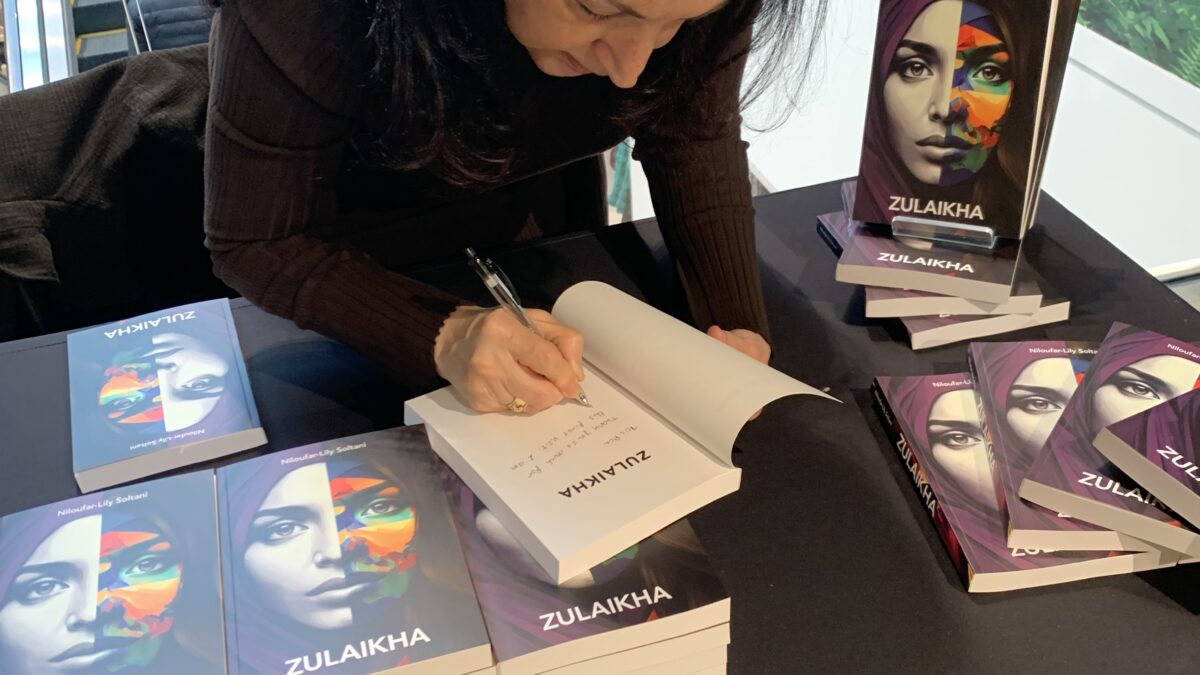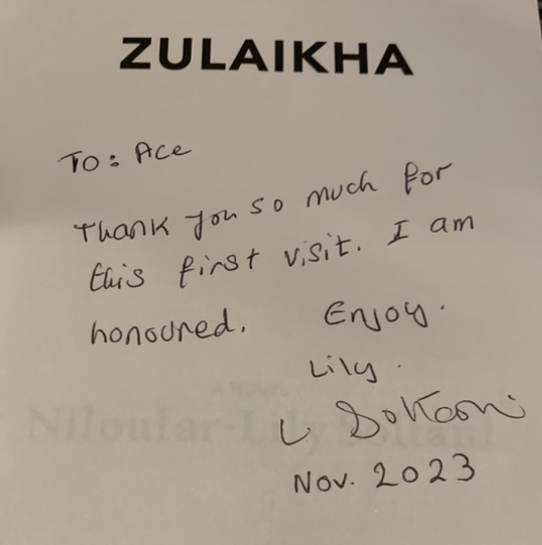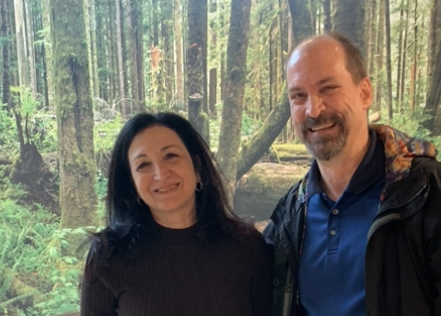Your cart is currently empty!
POWER POSITIONS IN PROSE: Niloufar-Lily Soltani’s ZULAIKHA
I met Lily Soltani at the Robson Indigo bookstore this past weekend, where she was doing a book signing.

In fact, I was the first to get a signed copy…

I cracked open the cover, began to read, and quickly discovered what the publisher, Inanna, must have noticed when they selected this book for publication; what CBC must have noticed when they selected it as a must read for 2023; what you will notice when you pick up a copy for yourself…
Soltani understands her craft.
For those who write poetry, a “power position” for a word is at the end of a line, or, especially, at the end of a stanza. For those who write prose, it is found at the end of a sentence, or, especially, at the end of a paragraph. Putting strong words with heavy negative or positive connotations in these positions adds emphasis.
I didn’t need to read far to see that Soltani has this tool in her writing toolbox. In fact, let’s look at the end lines of the first three paragraphs of ZULAIKHA:
- Connotative words ending the first two paragraphs. The first two paragraphs end on words that have a negative feeling: “trouble” and “end.”
- Dilemma. The end of the first paragraph reads “Watching Tehran as the underworld, she wondered which would be safer, floating aimlessly in the air or landing in a city where you know you are in trouble. Notice the two choices: be confused, spinning in space, or land where there is no confusion: you are in trouble. There is no way out, and Soltani quickly establishes pathos for her narrator. The parallelism of the phrasing also creates flow: floating here, or landing there.
- Contrast. Since I just mentioned parallel structure, let’s look at it again in the final line of the second paragraph, where Soltani adds contrast. The full final sentence in that paragraph reads “A ghost of her past appeared in Europe, in a crowded airport as her pleasant vacation was about to end.” You can hear the parallel parts that create flow, “crowded airport” and “pleasant vacation,” but notice that one has negative connotation (“crowded”) and the other positive (“pleasant”). Contrast makes writing interesting. It also adds more pathos here: the character’s comfortable world is about to end.
- Rule of three. Soltani packs the hardest punch at the end of the third paragraph. There is something about the flow of three in English; it is pleasant to the ear. If you save the hardest-hitting words for the third part, they will get noticed and they will linger. So for the third paragraph, let’s look at the final three sentences together:
But it was always enough to mention their names or ask about them: Abbass, her murdered friend, or Hessam, her missing brother. Enough to bring them back and let them haunt her. Yesterday, someone called their names. Someone asked about them.
There is so much going on here:
Parallelism? Yes: “mention their names” or “ask about them”; “Abbass, her murdered friend” or “Hessam, her missing brother”; “bring them back” and “let them haunt her”; “someone called” and “someone asked.”
Contrast? Yes: “murdered friend” (negative positive) and “missing brother” (negative positive).
A circle back? Yes. Notice how she uses the word “haunt” here, and in the last line of the previous paragraph, she mentions “a ghost of her past.” It’s a nice link that extends the metaphor and adds to atmosphere.
Normal world disturbed. The two people are murdered and missing. Now someone is mentioning their names, asking about them. World disturbed, just like that.
This is my first experience with Soltani’s work, but it would not surprise me to find out that she writes poetry as well if that is the case. She plays with sound, flow, and figurative language, all while telling a compelling tale.
Read this the first time to enjoy the story and the characters.
Then, if you are a writer, read it a second time to examine craft. Lily Soltani is an author on my reader and writer radar! She should be on yours too. Find a copy of Zulaikha here: ZULAIKHA


Leave a Reply